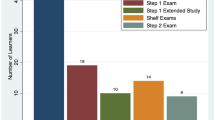Abstract
Law education at the University of Limburg (Maastricht, The Netherlands) features small-group tutorials alternating with periods of independent study. Every group of 10 students was tutored by a staff member or an undergraduate student from the third or fourth year. Students guided by a staff member scored significantly higher on a test designed to measure higher order cognitive skills than students guided by a student tutor. Student tutors were rated no differently from staff tutors with respect to the way they stimulated learning processes, directed the discussion content and monitored the discussion process. It seems that in a quantitative way, staff tutors and student tutors behave more or less the same. Qualitatively, however, there may be differences in their behavior which the tutor functioning questionnaire is unable to tap. Interventions of staff tutors may be more to the point than those of student tutors due to the fact that they are experts in their fields.
Similar content being viewed by others
References
Cate, Th. J. ten (1986). Leren in groepen zonder docent (Learning in Teacherless Groups. University of Amsterdam: Unpublished doctoral dissertation.
Cornwall, M.G. (1979). Students as Teachers: Peer Teaching in Higher Education. University of Amsterdam: C.O.W.O.
De Volder, M.L., de Grave, W.S. & Gijselaers, W.H. (1985). ‘Peer teaching: Academic achievement of teacher-led versus student-led discussion groups’, Higher Education, 14, 643–650.
Grave, de, W.S., De Volder, M.L., Gijselaers, W.H. & Damoiseaux, V. (in press). ‘Peer teaching and problem-based learning: Tutor characteristics, group functioning and student achievement’, in: Schmidt, H.G., Lipkin Jr. M., de Vries, M.W. & Greep, J.M. (eds.), Education for Tomorrow's Medicine Today. New York: Springer.
Goldschmid, B. & Goldschmid, M.L. (1976). ‘Peer teaching in higher education: A review’, Higher Education, 5, 9–33.
Moust, J.H.C. & Nuy, H.J.P. (1987). ‘Preparing teachers for a problem-based student-centered law course’, The Journal of Professional Legal Education, 5, 16–31.
Norman, D.A. (1978). ‘Notes toward a theory of complex learning’, in: A.M. Lesgold, J.W. Pellegrino, S.D. Fokkema & R. Glaser (eds.), Cognitive Psychology and Instruction. New York: Plenum Press.
Peters, R.J. (1966). Ethics and Education. London: Allen and Urwin.
Rummelhart, D.E. & Norman, D.A. (1978). ‘Accretion, tuning and restructuring: Three modes of learning’, in J.W. Cotton & R.L. Klatzky (eds.), Semantic Factors in Cognition. Hillsdale, N.J.: Lawrence Erlbaum Associates.
Schmidt, H.G. & De Volder, M.L. (eds.) (1984). Tutorials in Problem-Based Learning. Assen, The Netherlands: Van Gorcum.
Author information
Authors and Affiliations
Rights and permissions
About this article
Cite this article
Moust, J.H.C., De Volder, M.L. & Nuy, H.J.P. Peer teaching and higher level cognitive learning outcomes in problem-based learning. High Educ 18, 737–742 (1989). https://doi.org/10.1007/BF00155664
Issue Date:
DOI: https://doi.org/10.1007/BF00155664




